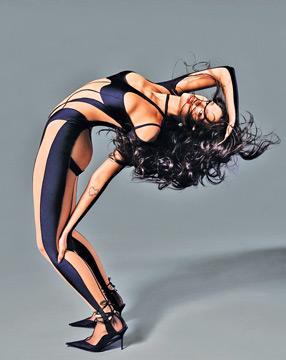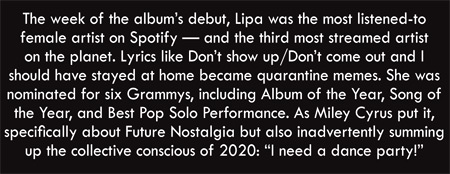
We’re standing next to a 15-ton meteorite when it occurs to Dua Lipa that, for maybe one of the first times in many months, her life is back to an approximation of what it might be in that very moment if the Corona virus pandemic had never happened. That is not to say that her day — which has involved waking up on luxuriant sheets in Manhattan’s Bowery Hotel, wearing a black silk bralette as a bona fide shirt, eating a dessert that looks like a gilded egg atop a nest in a private dining room on the 101st floor of Hudson Yards, doing an interview for the Grammys, and wandering after hours in the American Museum of Natural History, a locale chosen for its tenuous connection to the disco-space vibe of her second album, Future Nostalgia — is normal, per se.
Covid-19 tests
 But until about a week ago, she should have been on an eight-month tour to promote Future Nostalgia, which she most certainly was not.
But until about a week ago, she should have been on an eight-month tour to promote Future Nostalgia, which she most certainly was not.
 It was mid-December 2020, a week when the tour would have been over, when life would have gone back to some sort of pop-star version of ‘normal,’ doing the kind of things she’s done today, even if she’s currently doing them behind a black mask and in between a continuous series of Covid-19 tests. “I get tested all the time,” she had told me earlier from across a wide table, removing the mask to tuck into that gilded egg.
It was mid-December 2020, a week when the tour would have been over, when life would have gone back to some sort of pop-star version of ‘normal,’ doing the kind of things she’s done today, even if she’s currently doing them behind a black mask and in between a continuous series of Covid-19 tests. “I get tested all the time,” she had told me earlier from across a wide table, removing the mask to tuck into that gilded egg.
It was certainly not a year to cry for the suffering of pop stars (see: luxurious sheets, gilded desserts, after-hours VIP tours). But for Lipa — the breakout pop star of the pandemic era — the past nine months have been a study in how to not lose momentum when the world is pressing pause.
Last winter, she returned home from Australia to find her London flat flooded and that plumbers, like the rest of the city, were in lockdown. She was thus living in an Airbnb with both a mini fridge (“I was like, ‘This isn’t going to work for a pandemic’ ”) and boyfriend Anwar Hadid (regular model and brother to supermodels Gigi and Bella).
Future Nostalgia
News hit in late March that Future Nostalgia had leaked. As artists like Lady Gaga and Sam Smith were deciding to delay their album releases, Lipa’s hands were tied: She took to Instagram Live to tearfully announce the album would be coming out early, right into the throes of a burgeoning global health crisis. She worried it would get lost in the much bigger story that was unfolding and/or that it might feel unseemly in the moment, a feel-good collection of up tempo bangers released amid a deadly crisis. “I was terrified,” she says now, circling the meteorite. “But at the same time, I was like, ‘For some people, this is a form of escapism?’ ”
It certainly was. As Lipa found herself promoting a new album from the sofa of her Airbnb, Future Nostalgia became the soundtrack to sock-footed solo dance parties the world over (or to twerking in your dining room, as she later put it on Jimmy Kimmel Live). Maybe none of us knew that this was the music we wanted to hear right then, but Lipa showed us that it was. “It was a little bit of a sucker punch,” says collaborator Mark Ronson. “I don’t think anybody was expecting Dua to deliver the great cohesive pop record of 2020, but there was a sonic cohesion in the way that Random Access Memories or The Suburbs or a Frank Ocean record feel cohesive — records that were made to sit together so people will buy it and digest it like that. And it hit right at the moment of lockdown.”
Nominations

 The week of the album’s debut, Lipa was the most listened-to female artist on Spotify — and the third most streamed artist on the planet. Lyrics like Don’t show up/Don’t come out and I should have stayed at home became quarantine memes. She was nominated for six Grammys, including Album of the Year, Song of the Year, and Best Pop Solo Performance. As Miley Cyrus put it, specifically about Future Nostalgia but also inadvertently summing up the collective conscious of 2020: “I need a dance party!”
The week of the album’s debut, Lipa was the most listened-to female artist on Spotify — and the third most streamed artist on the planet. Lyrics like Don’t show up/Don’t come out and I should have stayed at home became quarantine memes. She was nominated for six Grammys, including Album of the Year, Song of the Year, and Best Pop Solo Performance. As Miley Cyrus put it, specifically about Future Nostalgia but also inadvertently summing up the collective conscious of 2020: “I need a dance party!”
Suddenly, stuck at ‘home’ making banana jerky with Hadid, months away from seeing a glam team or an SNL appearance, or even her own furniture, Lipa found herself becoming one of the most powerful women in the pop industry. “It’s so crazy,” she says now, talking about the actual meteorite, but also inadvertently summing up her own meteoric rise. “I mean, I didn’t think it would look like that.” The question was, what on earth to do about it?
It’s safe to say that even in a world without Covid-19, the success of Future Nostalgia was not a foregone conclusion. But it’s also safe to say that Lipa is not one to leave things to chance. Certainly not when, as a teenager, she started recording herself singing covers in her friend’s boyfriend’s ‘bedroom studio’. Certainly not when she took that ‘portfolio,’ as she puts it, to London clubs like KOKO, where she felt she’d inevitably encounter music-industry folks she could play said covers for. Certainly not when she got herself scouted at’ Topshop’, signing with a modeling agency though she had no desire to actually be a model. “That was another thing where I was like, ‘OK, this is something that maybe could help me get out there.’ ” And it did: Her agency hooked her up with a job singing for an X Factor ad, where she was introduced to a producer who had worked with Ed Sheeran and One Direction. That led to an offer of a publishing deal (“I was excited by it, but had no idea what it meant”) and eventually to her manager, Ben Mawson, who got her signed with Warner.
Thus began several years of putting out singles, seeing what would stick. She quit her job at a restaurant called La Bodega Negra, but did so politely, assuming she might need to eventually go back: “In my head, I was like, ‘Who knows?’ I felt like I had so much proving to do.” She distinguished herself with her work ethic. “I’ve seen her get off a plane and hit a double session,” says producer Stephen’Koz’ Kozmeniuk. “That’s not normal. And getting thrown in a room with a million other people with three hours to write a song? It’s super intimidating. But she was just relentless.”
2017 debut
Lipa says that her 2017 debut was an exercise in finding her sound. “It was such an amalgamation of different genres that I’m passionate about, and discovering myself and my songwriting,” she tells me. The album showcased the loveliness of Lipa’s smoky voice and earned her a Grammy, but despite its obvious pleasures, it lacked an identity that could be singled out as Lipa’s own. And her live performances didn’t necessarily help her forge one, either. A YouTube comment on her appearance at the 2018 BRIT Awards — “I love her lack of energy. Go girl give us nothing” — became a full-on Twitter meme.
Still, the single New Rules became the moment’s ubiquitous breakup anthem, enumerating all the things one was not to do with someone who’d recently broken one’s heart (because, of course, “If you’re under him, you ain’t getting over him”). The song went multiplatinum, buoyed by the success of its video, in which a gaggle of stoic young women remind one another of the breakup rules as they stalk the halls of the hotel hosting their slumber party and brush one another’s luxuriant hair.
It presented a view of female solidarity that emerged as a theme for Lipa, showing up in videos for ‘IDGAF’ (populated by a diverse army of women in power suits) and Blow Your Mind (Mwah) (in which the fierce female ensemble projects tenderness toward one another and, at one point, hoists aloft signs reading ‘Dua for President’ and ‘You Can Sit With Us’). More than just offering #SquadGoals, the videos offered a vision of a feminism so ingrained as to be implicit. Three months after the New Rules video came out, the Harvey Weinstein scandal broke and the #MeToo movement exploded. Suddenly, young women brushing one another’s hair like that could be seen, at least within the parameters of pop, as performing a sort of political act — and it appeared that Lipa had already intuited this.
Solidarity theme
“It was this unconscious decision,” she says of the solidarity theme. “It was just very much like, ‘This is just what it is — me and the girls — and this is how we talk with our friends.’ ”
But Lipa kept talking, frequently pointing out the inconsistencies in how men and women are treated in the music industry. She called out Recording Academy President Neil Portnow’s 2018 comment that female performers needed to “step up” by casually announcing in her 2019 Grammy acceptance speech for Best New Artist, “I guess this year we really stepped up.” When she was chastised for attending Lizzo’s 2020 Grammy afterparty at the Crazy Girls strip club in Los Angeles, she defended not just herself but women in general. “I just feel like, if you’re a feminist, you have to also support women in all fields of work,” she says. “We have to support sex workers, we have to believe that that [work] is their choice and their right. It seems quite hypocritical, I think, people picking and choosing as to how they want to support women and when it suits them. That’s another form of misogyny, which really derives from the male gaze.”
In fact, when in thrall to the natural beauty on display at the museum, I casually mention Lipa’s own beauty, that the way she looks “maybe had a certain power,” she goes quiet for a moment and then gives me a generic answer about feeling better when she’s taking good care of herself. She’s far too poised to be truly prickly, but still, I can tell that I’ve stepped in it. I gingerly steer the conversation back on track.
Down –to- earth
Most pop stars try to curate the way gazes come their way. Even offstage, they seem to want to be viewed as extraordinary beings, to be gawked at and adored. Lipa apparently does not. In the pop landscape, and especially in person, she comes across as extraordinarily down-to-earth. “She obviously looks like an iconic pop star, but there’s nothing precious about it,” says Ronson, who should know a thing or two about precious pop stars. “There’s a lack of pretension or anything like that.” Over lunch, Lipa had been warm and gracious not just to me but to everyone we encountered, from the waitstaff (“Peppermint tea, please”; “That’s lovely”; “Thank you so much”) to the nervous young pastry chef who whisked her (masked) into the kitchen to demonstrate the complex construction of her gilded egg (“So pretty”; “I love it!”). She’d asked about my kids and our experience of the pandemic (not remotely a given in these type of encounters) and responded thoughtfully to what I said, all while giving off an air of calm, like some wise, old soul stuck improbably in a 25-year-old’s body. “I don’t have two personas, an alter ego for who goes onstage,” she told me. “I’ve never had that issue, figuring out, ‘I’m going to be this character today, or this is who I’m going to play, or this is the role I want to take on.’ It’s hard for me to make stories up.”
The last time I talk to Lipa — over Zoom, the week after our meeting in Manhattan — it’s the day after her extremely belated Saturday Night Live appearance, the first time she’d performed for a live audience since her album’s release. It was the last SNL episode of 2020.
And while 2020 may have been Lipa’s year, it was certainly a cruel one — so cruel that maybe it wasn’t just her music that appealed, but also the gratification of seeing a very talented but very grounded woman unapologetically grab her own success when so much felt out of control otherwise. That’s the sense I get, at least, when Lipa now reminds me of the question I’d asked before, the one about the power of her beauty.
“I’ve been thinking about it almost every day, and I was just a little bit taken aback,” she says, politely but firmly. “I’ve never really seen being pretty or beautiful as some kind of power. It’s never been something that I identify with and — with no disrespect to you, obviously — I feel like I was a little bit shortchanged in a way, because I don’t feel like I’ve gotten to where I am because of that. I’m extremely hardworking and driven, and I feel like that’s the reason why I got to where I am, through my hard work and my drive, and I just wanted to make that clear because it has been playing on my mind.”
In the blip of silence that follows, my feminism tries to brush itself off. I’m tempted to point out that more than one thing can be true, that an effect can have many causes, and that I had merely wanted to gauge her own self-perception about a particular, non-exhaustive trait. But then I think of all those shows, all those times singing all those lyrics she’d written to convince herself of her own strength. I think of her in all those sessions, trying to go against the grain — and of what her sense of self means for her ability to do so. Sometimes, I reason, empowerment is a matter of will. Sometimes the feminism must be explicit.
Gracious and unprickly
So I apologise, and I do so sincerely. And of course, she is gracious and unprickly as always.
Just before we sign off for the last time, I ask what hardly needs asking: if the process of willing herself into empowerment is complete. “Do you feel like you’re a female alpha now? Have you internalized that?”
“I’ve internalised that, yes,” she says without hesitation. “I feel good.”
Courtesy: Rolling Stone
